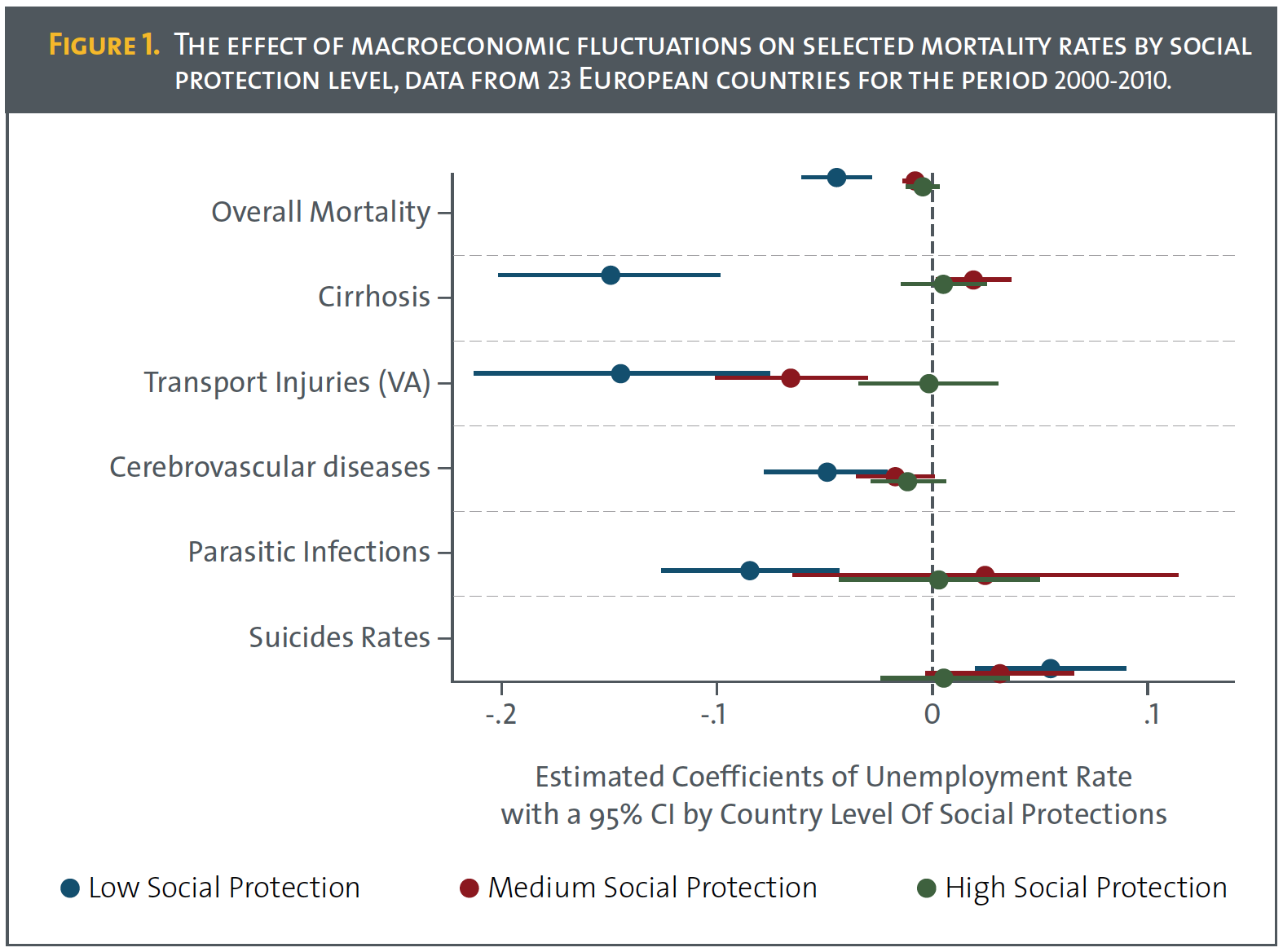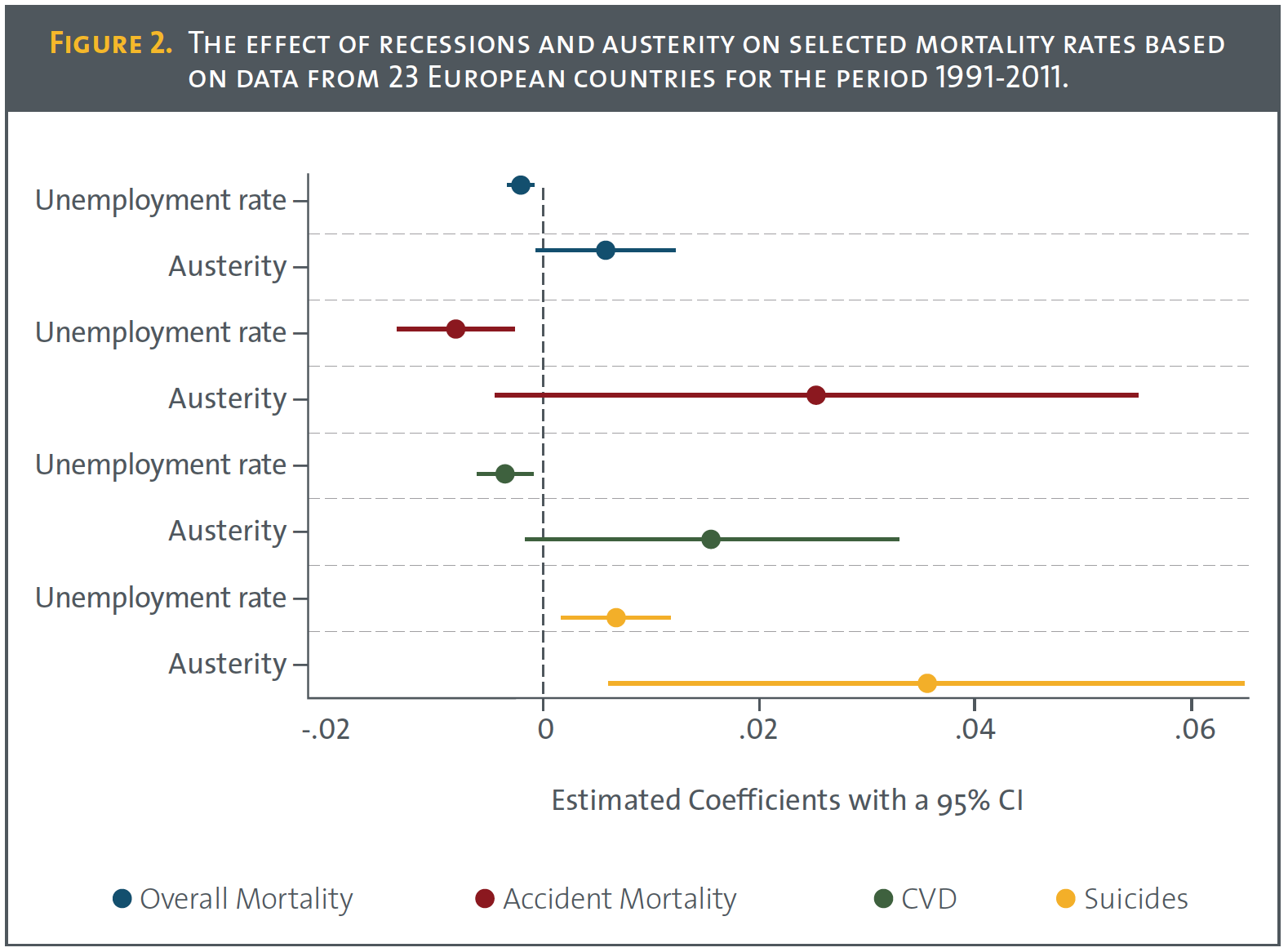Macroeconomic policies

In line with the common use of the term in economics, we define macro-economic policies as both monetary and fiscal policies. Macro-economic policies are likely to be a key policy area influencing population health and health inequalities, mainly via their influence on socio-economic factors, which then in turn are known to affect health.
Yet, to the best of our knowledge, previous research has not specifically examined the impact of either monetary or fiscal policies (or of both in combination) on health or health inequalities.
Main findings
Has the Great Recession been bad for health? It depends.
Overall, during the recent recession, a 1% increase in the standardised unemployment rate has been associated with statistically significant reductions in all-cause-mortality, cirrhosis- and chronic liver disease-related mortality, motor vehicle accident-related mortality and parasitic infection-related mortality. At the same time, it has also been associated with an increase in the suicide rate. In general, the effects were more marked in countries with lower levels of social protection, compared to those with higher levels (1).
In a more methodological study we found that the effects of recessions on mortality do differ in key ways depending on the specific methodology applied (2).
A detailed country-specific analysis on Spain provided a more complex picture of the health effects resulting from recessions: while we confirmed the counter-intuitive result that a recession, even one that has been as severe as the recent Spanish one, may have improved overall self-reported health, certain dietary behaviours as well as mental health in men were shown to have deteriorated, while other inequalities in health and health behaviour relating to socioeconomic factors widened (3,4).
A review of all the evidence from the recent crises in Iceland, Greece and Spain found that mental health was affected in all the three countries, and revealed again the influence of the extent of the recession and the level of social protection, as the worst health impacts were observed in Greece (5).
Economic crises and alcohol consumption: a realist systematic review (6).
Economic crises are complex events that affect behavioural patterns (including alcohol consumption) via opposing mechanisms. Through this realist systematic review, we aimed to investigate evidence from studies of previous or current crises in which mechanisms play a role among which individuals, in order to understand and predict the potential impact of economic crises on alcohol consumption. We found 16 studies with evidence on two behavioural mechanisms by means of which economic crises can influence alcohol consumption and alcohol-related health problems. The first mechanism suggests that psychological distress triggered by unemployment and reductions in income can exacerbate problems associated with alcohol consumption. The second mechanism suggests that tighter budget constraints result in less money being spent on alcoholic beverages. Across many countries, the psychological distress mechanism was observed mainly in men. The tighter budget constraints mechanism seems to play a role in all population subgroups across all countries covered in the these studies. For other mechanisms (i.e. deterioration in the social situation, fear of losing one's job, and an increase in non-working time), empirical evidence was scarce or absent or did not provide sufficient coverage. This review suggests that among men (but not among women), the net impact of economic crises will be an increase in harmful drinking. This could potentially contribute to an increase in gender-related health inequalities during a crisis.
(1). Toffolutti V, Suhrcke M. Assessing the short term health impact of the great recession in the European Union: A cross-country panel analysis. Prev Med. 2014; 64:54-62.
(2). Toffolutti V, Morciano M, Suhrcke M. Estimating the impact of unemployment on mortality in Europe. Different methods, different results? Forthcoming.
(3). Bartoll X, Palència L, Malmusi D, et al. The evolution of mental health during the Spanish economic crisis. Eur J Public Health. 2014; 24:415-418.
(4). Bartoll X, Toffolutti V, Malmusi D, et al. Health and health behaviours before and during the Great Recession, overall and by socioeconomic status, using data from four repeated cross-sectional Health Surveys in Spain (2001-2012). BMC Public Health, 2015; 15:865.
(5). Bacigalupe A, Shahidi FV, Muntaner C, et al. Why is There so Much Controversy Regarding the Population Health Impact of the Great Recession? Reflections on Three Case Studies Int J Health Serv, 2015; doi: 10.1177/0020731415611634
(6). de Goeij MCM, Suhrcke M, Toffolutti V, et al. How economic crises affect alcohol consumption and alcohol-related health problems: a realist systematic review. Soc Sci Med. 2015; 131:131-146.
While recessions may have reduced mortality rates, austerity regimes appear to have increased them.
(7). Toffolutti V, Suhrcke M. Does austerity really kill? Forthcoming.
Policy implications
Even though recessions may reduce mortality in the short term, such effects may be more than offset by increased mortality resulting from austerity policies, at least in the case of some causes of mortality.
Social protection policies appear to be effective in limiting changes in mortality attributable to macroeconomic fluctuations.
Interventions to protect and promote mental health, to prevent suicides and to treat mental disorders become particularly significant in times of economic hardship.
Research team
Work Package 1 (Macroeconomic policies) has been led by Marc Suhrcke, University of East Anglia (UEA) and Centre for Health Economics (CHE), University of York.
Other partners involved were Agència de Salut Pública de Barcelona and Academic Medical Center.





